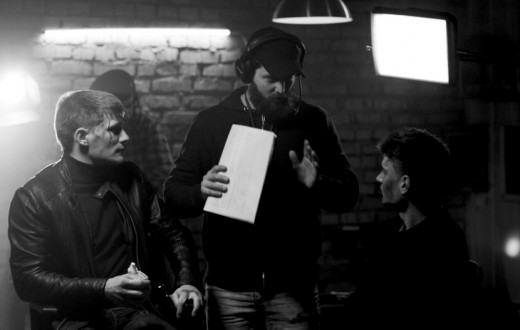A playful conversation with Casting Director, Producer, Consultant – Jodi Collins
In New York there is something in the water that breeds a comedic sensibility, says Casting Director Jodi Collins who specializes in the funny business – aka… casting comedic actors in career changing, paying gigs.
Jodi Collins began as an actor. She graduated from NYU Tisch with a BFA (minor in Communications) and lived in New York when the comedy scene really started thriving. Later on, she combined her love for acting with a passion for teaching and casting. The result – Jodi Collins Casting which brings NY talent in front of major networks (including Comedy Central, HBO, FOX, VH1, etc), film, theatre and web projects. From both an acting and comedy background, Jodi believes that the road to paying work… begins with freeing yourself.
It all comes down to playing smartly, Jodi says. Be free and open, use your imagination, allow that to wander and have fun. That is how anyone begins to explore anything and at it’s best it’s comedy. Many brilliant dramatic actors originated in comedy. People like Whoopi Goldberg, Tom Hanks, Greg Kinnear, and even Judi Dench – all can be intense, dark, dramatic – but also brilliantly funny. It goes back to the idea of originating in play, spirit imagination and throwing yourself in totally.
Becoming totally, seriously, funny takes a certain skill set and Jodi shared with NYCastings her funny bone insight…
Q. Can anyone be funny, or just those who drink NY water and eat the bagels?
A. Anybody that goes into acting probably has the ability to play – and whether someone can land the timing or not can be developed by studying text and being able to feel things and really let go.
Q. Improv is huge now. How does it help actors let go and be hilarious?
A. When the improv scene came to NY in a bolder way, I was casting more commercials, broadcast network pilot presentations and some of what I was drawn to were groups; Burn Manhattan, Instant Girl (who were like Ivy League chicks on acid), and a show called Exit 57 with Amy Sedaris and Jody Lennon. They were all based in improv and sketch. Later, UCB began to mill about, and to me there was something about it that incorporated the actor’s position of being in the moment, the comic’s mind of thinking in the moment, and the creative mind of being able to play and move a story. There was something exciting about someone who could incorporate improv and make something brilliant. It allowed personalities to be very clear. In the commercial world, which is so type driven, improv also allows you to snap your signature onto something. It gives a sense of personality in conjunction with the actor. And for that actor it’s empowering to beallowed the room to put their own identity on things. It not like they are only reliant on sticking within a specific box. It allows room for an authentic point of view from the mind and the artist’s core.
Q. Should an actor always break out their improv tool set?
A. They have to use it wisely. You can’t minimize the writer’s need to have his words articulated exactly. But where there’s room for it… its cool. It depends on the audition, on a case-by-case basis. Many of my auditions have improv in them because of the directors I work with. There are many actor / directors that love working improvisationally. It’s always smart to ask unless you’ve come in for an improv audition.
Q. When at a comedy audition how do you dress the part as funny yet smart?
A. You have to embrace the total package; the tone of the project, the characters that live in it and be super specific the same way you are super specific in details creating a role. Be super smart about your choices and make sure your choices are clearly seen and felt.
Q. Beyond auditions, can creating original content help actors get noticed?
A. That’s really important – if they have something to say. As an artist, you have a need to express yourself and the more you can get your work out there and not rely on someone to hire you the better as long as its quality not just to have something to showcase. Have something to say that you’re passionate about, a point of view that’s specific.
Q. As a Casting Director, you also teach classes. Are these auditions – or a place to learn freely?
A. It’s a case by case basis. Casting directors are always looking. Like actors, we are always working, staying fresh for whatever that next job may be. When you are watching a 1 time at those facilities like One on One – I would consider that an audition. But I teach a 4 week class for comedy people to be able to take their craft at whatever level and apply it to auditions. I am there as a teacher to really nurture the best out of people and hone what I see as their craft. By the same token, if I see someone who is right for something I have going on you better believe I’m bringing them in. I’m not going to hold someone accountable for making a wrong choice because it’s a learning experience but I will reward those who are making high caliber choices if they are ready to be in the professional world.
Q. Can an actor break into this business by performing in local plays or shows?
A. Yeah I think a great thing for actors coming up is to be in a show, in a decent feeling space. And if there is someone in the cast already working it identifies to the industry what kind of work they are going to.
Q. How do you spot comedic talent?
A. Some casting directors are born with an intuitive feeling and others develop it by doing what we do over and over. It’s not unlike an actor who gets better at their craft by doing it for a long time. For me, my entire background helps me. What do I find interesting as an audience member? That helps me spot talent.
New York’s streets are paved with comedy gold and Jodi is always attending shows, networking, and helping actors grow.






